Enforcement of Child Support Orders Information from Divorce Law South Carolina
Parents who routinely fail to pay child support have the amounts deducted from their wages under state and federal laws. All child support orders authorize a wage deduction from the paying parent's job income. Additionally, tax refunds can be seized if child support is owed. Commonly, the non-paying parent is held in contempt of court and is fined or even jailed for failing to make child support payments. The parent who should be receiving child support payments (and is not) generally files a motion asking the court to enforce the child support payments.
SIDEBAR: Holding the non-paying spouse in contempt is a tricky remedy, because a person in jail obviously cannot earn income. Judges take this into consideration before placing a parent in jail.
TIP: Interest accrues on unpaid child support.
Uniform Interstate Family Support Act (UIFSA)
The Uniform Interstate Family Support Act allows parents to more easily collect child support from parents who live in other states. The Act permits only one support order to be in effect for the child, which consequently allows for one controlling order (rather than several issued by the different states).
Significantly, the Act allows the state that issued the order to withhold income from the parent who is not paying, although he is employed in another state. "Direct income withholding" is accomplished by sending the child support order directly to the out-of-state employer who, under federal law, must comply with a "wage withholding order."
TIP: Child support orders should be registered in the state where the paying parent lives.
Child support lien
Laws may allow the parent who is not receiving child support to obtain a lien on the non-paying parent's property. A person with a lien can seize the property and sell it to satisfy an outstanding debt. Typically, personal property is seized by the sheriff and sold at auction. The proceeds go to pay off the child support arrears.









